2023届高考英语二轮复习情态动词课件(28张PPT)
文档属性
| 名称 | 2023届高考英语二轮复习情态动词课件(28张PPT) | 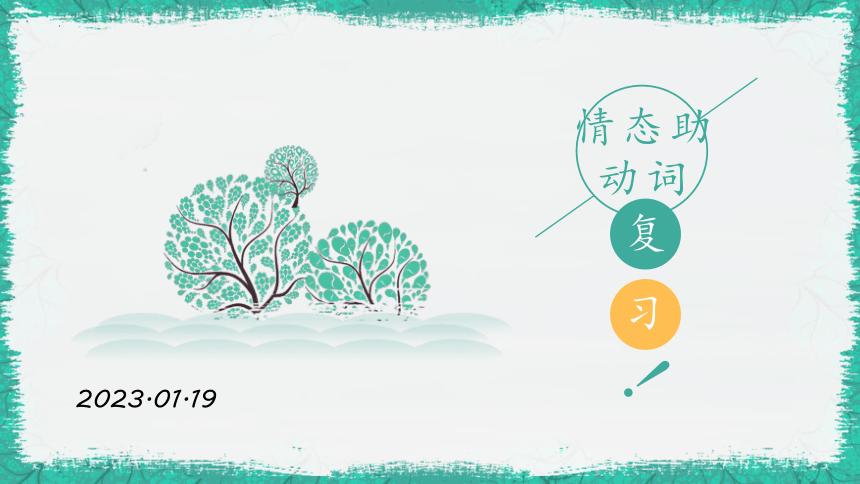 | |
| 格式 | zip | ||
| 文件大小 | 1.0MB | ||
| 资源类型 | 教案 | ||
| 版本资源 | 通用版 | ||
| 科目 | 英语 | ||
| 更新时间 | 2023-01-19 11:57:29 | ||
图片预览


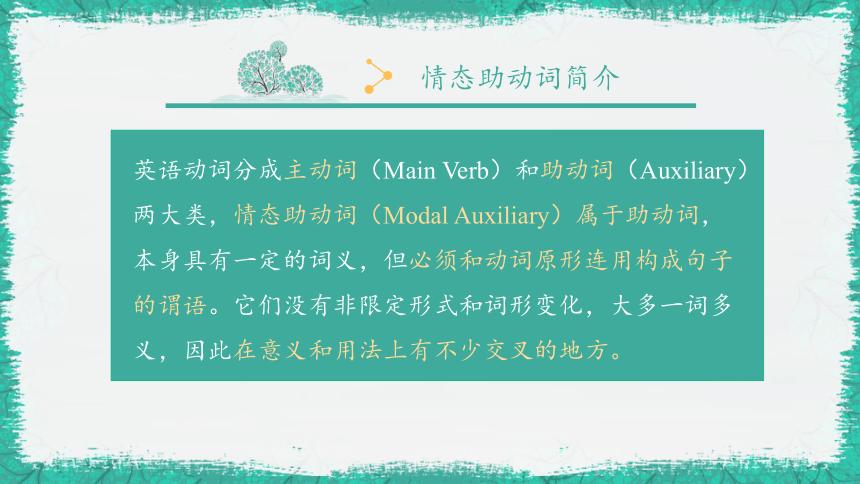
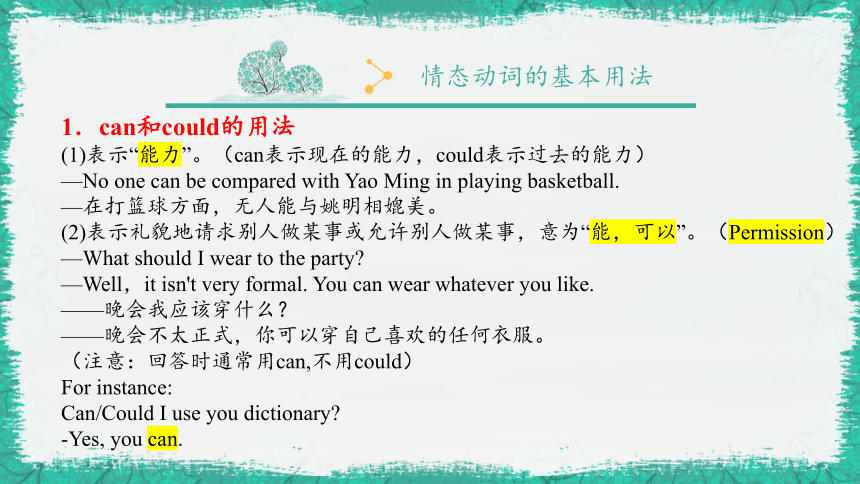
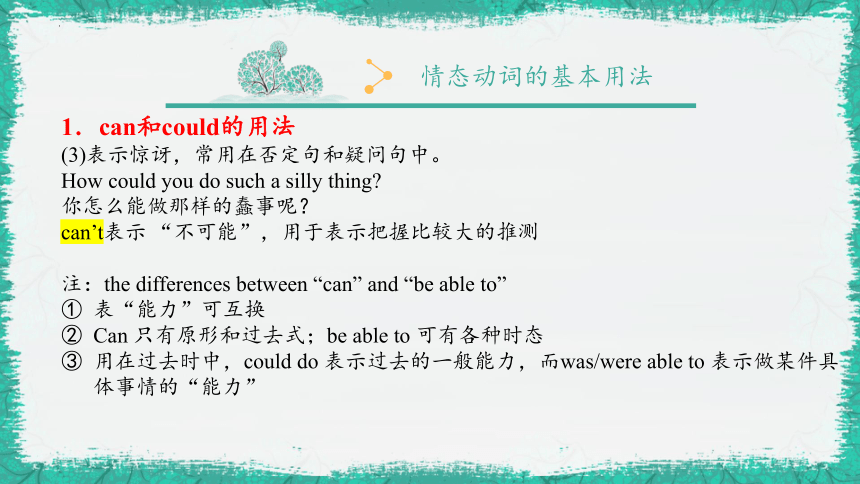
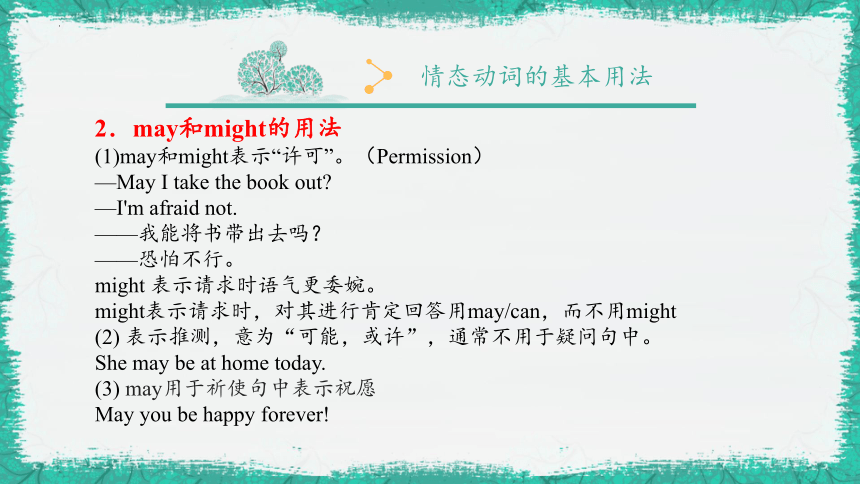
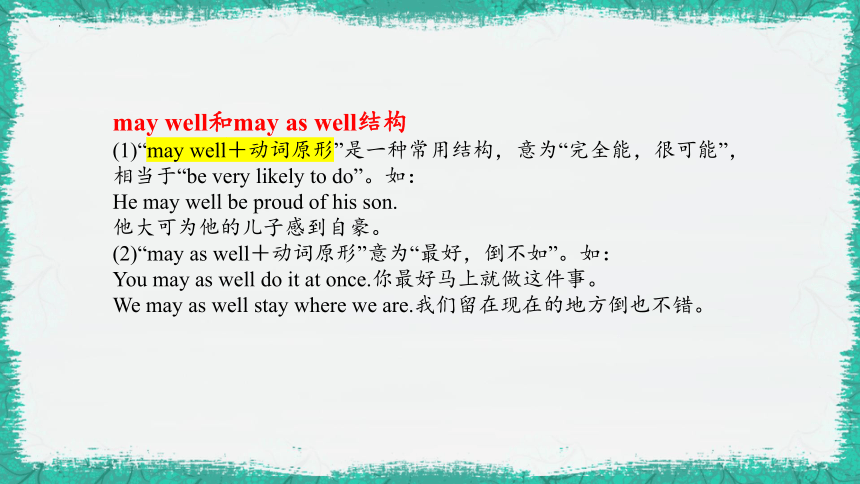
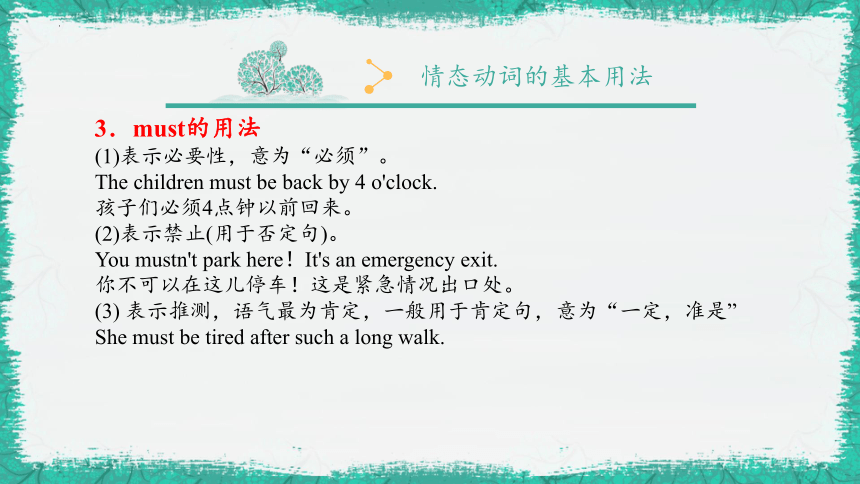

文档简介
(共28张PPT)
情态助动词
复
习
!
2023.01.19
01
情态助动词
英语动词分成主动词(Main Verb)和助动词(Auxiliary)两大类,情态助动词(Modal Auxiliary)属于助动词,本身具有一定的词义,但必须和动词原形连用构成句子的谓语。它们没有非限定形式和词形变化,大多一词多义,因此在意义和用法上有不少交叉的地方。
情态助动词简介
情态动词的基本用法
1.can和could的用法
(1)表示“能力”。(can表示现在的能力,could表示过去的能力)
—No one can be compared with Yao Ming in playing basketball.
—在打篮球方面,无人能与姚明相媲美。
(2)表示礼貌地请求别人做某事或允许别人做某事,意为“能,可以”。(Permission)
—What should I wear to the party
—Well,it isn't very formal. You can wear whatever you like.
——晚会我应该穿什么?
——晚会不太正式,你可以穿自己喜欢的任何衣服。
(注意:回答时通常用can,不用could)
For instance:
Can/Could I use you dictionary
-Yes, you can.
情态动词的基本用法
1.can和could的用法
(3)表示惊讶,常用在否定句和疑问句中。
How could you do such a silly thing
你怎么能做那样的蠢事呢?
can’t表示 “不可能”,用于表示把握比较大的推测
注:the differences between “can” and “be able to”
表“能力”可互换
Can 只有原形和过去式;be able to 可有各种时态
用在过去时中,could do 表示过去的一般能力,而was/were able to 表示做某件具体事情的“能力”
情态动词的基本用法
2.may和might的用法
(1)may和might表示“许可”。(Permission)
—May I take the book out
—I'm afraid not.
——我能将书带出去吗?
——恐怕不行。
might 表示请求时语气更委婉。
might表示请求时,对其进行肯定回答用may/can,而不用might
(2) 表示推测,意为“可能,或许”,通常不用于疑问句中。
She may be at home today.
(3) may用于祈使句中表示祝愿
May you be happy forever!
may well和may as well结构
(1)“may well+动词原形”是一种常用结构,意为“完全能,很可能”,相当于“be very likely to do”。如:
He may well be proud of his son.
他大可为他的儿子感到自豪。
(2)“may as well+动词原形”意为“最好,倒不如”。如:
You may as well do it at once.你最好马上就做这件事。
We may as well stay where we are.我们留在现在的地方倒也不错。
情态动词的基本用法
3.must的用法
(1)表示必要性,意为“必须”。
The children must be back by 4 o'clock.
孩子们必须4点钟以前回来。
(2)表示禁止(用于否定句)。
You mustn't park here!It's an emergency exit.
你不可以在这儿停车!这是紧急情况出口处。
(3) 表示推测,语气最为肯定,一般用于肯定句,意为“一定,准是”
She must be tired after such a long walk.
情态动词的基本用法
4.shall和should的用法
(1)shall的用法
①用于第一、第三人称疑问句中,表示说话人征求对方的意见或向对方请示。
Shall I go out for a walk after supper
晚饭后我可以散散步吗?
②shall与第二、三人称连用,用于陈述句中,表示说话者的意志,用来表达说话者给对方以命令、指示或允诺。此外,当宣布法律、规定时,也用shall来表达。如:
—Will you read me a story,Mummy
—OK. You shall have one if you go to bed as soon as possible.(允诺)
It has been announced that candidates shall remain in their seats until all the papers have been collected.
已宣布,在所有试卷收上来之前,应试者必须留在自己的座位上。(规则或规定)
情态动词的基本用法
4.shall和should的用法
(2)should的用法
should意为“(义务上)应该”,在语气上比must(必须)弱。“should+动词原形”表示现在或将来应该……。如:
I should go and visit him this afternoon,but I wonder if I will be free.
今天下午我应该去看望他,但我不知道我是否有空。(表示将来应该)
The children should be taken good care of.
这些孩子应该受到好的照顾。
表示惊讶、忧虑、惋惜等情绪,意为"竟会,竟然"。
It’s a pity that you should be so careless. Why should anyone want to marry Tony
情态动词的基本用法
5.will和would的用法
(1)表示意志、意愿和决心,would用于过去的情况。
You can stay here as long as you can,if you will.
如果你愿意,你能在这里待多长时间就待多长时间。(表示主语的意愿)
(2)will(won't)可用来叙述真理,还可叙述目前的习惯,would(wouldn't)可以用来叙述过去的习惯。如:
Oil will float on water.油能浮在水面上。
She will listen to records alone in her room for hours.
她独自一人在屋里听唱片,常常一听就是几个小时。
He would spend hours in the bathroom or on the telephone.
他以前一进洗澡间或是一打电话,往往就是几个小时。
情态动词的基本用法
5.will和would的用法
特别注意:would和used to都可表示过去的习惯,但前者表示过去反复的动作,常与every day,often,frequently等连用;后者表示过去的状态或过去的习惯,但现在已不存在。如:
When he was abroad,he would read as many books as possible.在国外时,他总是尽可能多读书。
She doesn't get up so early as she used to.她不像以前那样起得那么早了。
情态动词的基本用法
6.need和dare的用法
need和dare两者既可用作情态动词也可用作实义动词。作实义动词时,有人称和数的变化,可用于肯定句、否定句或疑问句中,构成否定句或疑问句时要用助动词do,does,did;作情态动词时,没有人称和数的变化,直接接动词原形,只用于否定句和疑问句中,构成否定句和疑问句时不用助动词。
另外,dare作情态动词时,还可用于条件句中,过去式为dared;作实义动词时,dare常用于疑问句或否定句,后面的to也可省略;I dare say是习惯说法,意为“我想,大概”。
情态动词的基本用法
6.need和dare的用法
He needn't do it.(情态动词)
He doesn't need to do it.(实义动词)
他不必做这件事。
I didn't know whether he dared say that to him.(情态动词,有时态变化)
我不知道他是否敢对他说那话。
He didn't dare(to) do it.(实义动词)
He dared not do it.(情态动词)
dare的习惯用法:
1. I dare say. 也许,我想
e.g. It will rain this afternoon, I dare say.
2. How dare+句子。"……竟敢……
表示对他人行为感到愤怒
e.g. How dare you open my drawer without my permission!
情态动词基本语法功能:
用法 请求/许可 可能/推测 义务/职责 意图/打算 意愿/愿意 意志/决心 才能/能力
can/could √ √ √
may/might √ √
shall/should √ √ √ √ √ √
will/would √ √ √ √ √
must √ √
ought to √ √
02
“情态动词+ have done”结构
“情态动词+have done”既可表示对过去情况的推测,又可表示某种情绪、态度。情态动词不同,该结构所表示的含义也不同。
1.should/ought to+have done
表示“过去本应该做而(实际)没有做的事情”,含有责备或遗憾的语气,意为“本应该……”。其否定形式为“should not/ought not to+have done”,表示某种行为本不该发生但实际上发生了。
You ought to have done this exercise more carefully.
你本应该更仔细地做这个练习。
You shouldn't have told her the truth.
你本不该告诉她真相。
2.must+have done
用于肯定句,表示“过去一定做过某事”,是一种很有把握的推测。注意:对过去发生的情况的否定推测常用“can't/couldn't+have done”表示。
—Ye Shiwen won two gold medals in London Olympic Games.
—She must have gone through tough training.
——叶诗文在伦敦奥运会上获得了两枚金牌。
——她肯定受过严格的训练。
It must have rained last night, for the road is quite muddy.
昨晚一定下雨了,因为路很泥泞。
3.may/might+have done
是对过去情况的一种不太有把握的推测,表示“可能已做了某事……”,否定句表示“可能还没有……”。
Sorry, I'm late. I might have turned off the alarm clock and gone back to sleep again.
对不起,我迟到了。我可能把闹钟关掉后又睡着了。
4.could+have done
表示“过去本来可以做,但实际上没有做”;can/could+have done表示“过去可能做过”。
I could have saved the poor rabbit, but I didn't have the right drugs with me at that moment.
我本来可以拯救那只可怜的兔子的,可是我当时没有合适的药品。
5.needn't+have done
表示“过去没有必要做某事,但实际上做了某事”。
Mark needn't have hurried.After driving at top speed,he arrived half an hour early.
马克本没必要那么匆忙。他以最快速度开车,结果早到了半个小时。
You needn't have taken a taxi here,for it was very near to my house.
你本来不必打车来这里的,因为这里离我家很近。
03
实操练习
1. I can’t find my purse. I ________ it in the supermarket yesterday, but I’m not sure. (2018年天津卷单项填空)
A. should leave B. must have left
C. might leave D. could have left
D
2. In today’s information age, the loss of data _________ cause serious problems for a company. (2018年北京卷单项填空)
A. need B. should
C. can D. must
C
I. 选用括号内合适的内容补全下面句子。
1. I'm sorry I couldn't get in touch with him before he left. I __________________ (should have phoned, have phoned) him earlier.
2. Since they aren't answering their telephone, they ______________ (can have left, must have left).
3. You ____________ (will, may) lead a horse to the water but you _________ (dare, can) not make it drink.
should have phoned
must have left
may
can
4. Mary _____________________ (couldn't have received, needn't have received) my email; otherwise she would have replied before now.
5. You ____________ (mustn't, needn't) do that if you don't want to.
6. I don't believe him. He ________ (may not, can't) be serious.
7. If you don't like to swim, you _______________ (may as well, may well) stay at home.
couldn't have received
needn't
can't
may as well
8. They hurried there only to find the meeting canceled. In fact, they __________________ (needn't have gone, wouldn't have gone) at all.
9. She was ill. She ______________________ (couldn't have attended, mustn't attend) the meeting here.
10. Carey didn't go to the party last night because she ________________ (should look after, had to look after) the baby for her sister until 9:30.
needn't have gone
couldn't have attended
had to look after
谢谢
观
看
!
情态助动词
复
习
!
2023.01.19
01
情态助动词
英语动词分成主动词(Main Verb)和助动词(Auxiliary)两大类,情态助动词(Modal Auxiliary)属于助动词,本身具有一定的词义,但必须和动词原形连用构成句子的谓语。它们没有非限定形式和词形变化,大多一词多义,因此在意义和用法上有不少交叉的地方。
情态助动词简介
情态动词的基本用法
1.can和could的用法
(1)表示“能力”。(can表示现在的能力,could表示过去的能力)
—No one can be compared with Yao Ming in playing basketball.
—在打篮球方面,无人能与姚明相媲美。
(2)表示礼貌地请求别人做某事或允许别人做某事,意为“能,可以”。(Permission)
—What should I wear to the party
—Well,it isn't very formal. You can wear whatever you like.
——晚会我应该穿什么?
——晚会不太正式,你可以穿自己喜欢的任何衣服。
(注意:回答时通常用can,不用could)
For instance:
Can/Could I use you dictionary
-Yes, you can.
情态动词的基本用法
1.can和could的用法
(3)表示惊讶,常用在否定句和疑问句中。
How could you do such a silly thing
你怎么能做那样的蠢事呢?
can’t表示 “不可能”,用于表示把握比较大的推测
注:the differences between “can” and “be able to”
表“能力”可互换
Can 只有原形和过去式;be able to 可有各种时态
用在过去时中,could do 表示过去的一般能力,而was/were able to 表示做某件具体事情的“能力”
情态动词的基本用法
2.may和might的用法
(1)may和might表示“许可”。(Permission)
—May I take the book out
—I'm afraid not.
——我能将书带出去吗?
——恐怕不行。
might 表示请求时语气更委婉。
might表示请求时,对其进行肯定回答用may/can,而不用might
(2) 表示推测,意为“可能,或许”,通常不用于疑问句中。
She may be at home today.
(3) may用于祈使句中表示祝愿
May you be happy forever!
may well和may as well结构
(1)“may well+动词原形”是一种常用结构,意为“完全能,很可能”,相当于“be very likely to do”。如:
He may well be proud of his son.
他大可为他的儿子感到自豪。
(2)“may as well+动词原形”意为“最好,倒不如”。如:
You may as well do it at once.你最好马上就做这件事。
We may as well stay where we are.我们留在现在的地方倒也不错。
情态动词的基本用法
3.must的用法
(1)表示必要性,意为“必须”。
The children must be back by 4 o'clock.
孩子们必须4点钟以前回来。
(2)表示禁止(用于否定句)。
You mustn't park here!It's an emergency exit.
你不可以在这儿停车!这是紧急情况出口处。
(3) 表示推测,语气最为肯定,一般用于肯定句,意为“一定,准是”
She must be tired after such a long walk.
情态动词的基本用法
4.shall和should的用法
(1)shall的用法
①用于第一、第三人称疑问句中,表示说话人征求对方的意见或向对方请示。
Shall I go out for a walk after supper
晚饭后我可以散散步吗?
②shall与第二、三人称连用,用于陈述句中,表示说话者的意志,用来表达说话者给对方以命令、指示或允诺。此外,当宣布法律、规定时,也用shall来表达。如:
—Will you read me a story,Mummy
—OK. You shall have one if you go to bed as soon as possible.(允诺)
It has been announced that candidates shall remain in their seats until all the papers have been collected.
已宣布,在所有试卷收上来之前,应试者必须留在自己的座位上。(规则或规定)
情态动词的基本用法
4.shall和should的用法
(2)should的用法
should意为“(义务上)应该”,在语气上比must(必须)弱。“should+动词原形”表示现在或将来应该……。如:
I should go and visit him this afternoon,but I wonder if I will be free.
今天下午我应该去看望他,但我不知道我是否有空。(表示将来应该)
The children should be taken good care of.
这些孩子应该受到好的照顾。
表示惊讶、忧虑、惋惜等情绪,意为"竟会,竟然"。
It’s a pity that you should be so careless. Why should anyone want to marry Tony
情态动词的基本用法
5.will和would的用法
(1)表示意志、意愿和决心,would用于过去的情况。
You can stay here as long as you can,if you will.
如果你愿意,你能在这里待多长时间就待多长时间。(表示主语的意愿)
(2)will(won't)可用来叙述真理,还可叙述目前的习惯,would(wouldn't)可以用来叙述过去的习惯。如:
Oil will float on water.油能浮在水面上。
She will listen to records alone in her room for hours.
她独自一人在屋里听唱片,常常一听就是几个小时。
He would spend hours in the bathroom or on the telephone.
他以前一进洗澡间或是一打电话,往往就是几个小时。
情态动词的基本用法
5.will和would的用法
特别注意:would和used to都可表示过去的习惯,但前者表示过去反复的动作,常与every day,often,frequently等连用;后者表示过去的状态或过去的习惯,但现在已不存在。如:
When he was abroad,he would read as many books as possible.在国外时,他总是尽可能多读书。
She doesn't get up so early as she used to.她不像以前那样起得那么早了。
情态动词的基本用法
6.need和dare的用法
need和dare两者既可用作情态动词也可用作实义动词。作实义动词时,有人称和数的变化,可用于肯定句、否定句或疑问句中,构成否定句或疑问句时要用助动词do,does,did;作情态动词时,没有人称和数的变化,直接接动词原形,只用于否定句和疑问句中,构成否定句和疑问句时不用助动词。
另外,dare作情态动词时,还可用于条件句中,过去式为dared;作实义动词时,dare常用于疑问句或否定句,后面的to也可省略;I dare say是习惯说法,意为“我想,大概”。
情态动词的基本用法
6.need和dare的用法
He needn't do it.(情态动词)
He doesn't need to do it.(实义动词)
他不必做这件事。
I didn't know whether he dared say that to him.(情态动词,有时态变化)
我不知道他是否敢对他说那话。
He didn't dare(to) do it.(实义动词)
He dared not do it.(情态动词)
dare的习惯用法:
1. I dare say. 也许,我想
e.g. It will rain this afternoon, I dare say.
2. How dare+句子。"……竟敢……
表示对他人行为感到愤怒
e.g. How dare you open my drawer without my permission!
情态动词基本语法功能:
用法 请求/许可 可能/推测 义务/职责 意图/打算 意愿/愿意 意志/决心 才能/能力
can/could √ √ √
may/might √ √
shall/should √ √ √ √ √ √
will/would √ √ √ √ √
must √ √
ought to √ √
02
“情态动词+ have done”结构
“情态动词+have done”既可表示对过去情况的推测,又可表示某种情绪、态度。情态动词不同,该结构所表示的含义也不同。
1.should/ought to+have done
表示“过去本应该做而(实际)没有做的事情”,含有责备或遗憾的语气,意为“本应该……”。其否定形式为“should not/ought not to+have done”,表示某种行为本不该发生但实际上发生了。
You ought to have done this exercise more carefully.
你本应该更仔细地做这个练习。
You shouldn't have told her the truth.
你本不该告诉她真相。
2.must+have done
用于肯定句,表示“过去一定做过某事”,是一种很有把握的推测。注意:对过去发生的情况的否定推测常用“can't/couldn't+have done”表示。
—Ye Shiwen won two gold medals in London Olympic Games.
—She must have gone through tough training.
——叶诗文在伦敦奥运会上获得了两枚金牌。
——她肯定受过严格的训练。
It must have rained last night, for the road is quite muddy.
昨晚一定下雨了,因为路很泥泞。
3.may/might+have done
是对过去情况的一种不太有把握的推测,表示“可能已做了某事……”,否定句表示“可能还没有……”。
Sorry, I'm late. I might have turned off the alarm clock and gone back to sleep again.
对不起,我迟到了。我可能把闹钟关掉后又睡着了。
4.could+have done
表示“过去本来可以做,但实际上没有做”;can/could+have done表示“过去可能做过”。
I could have saved the poor rabbit, but I didn't have the right drugs with me at that moment.
我本来可以拯救那只可怜的兔子的,可是我当时没有合适的药品。
5.needn't+have done
表示“过去没有必要做某事,但实际上做了某事”。
Mark needn't have hurried.After driving at top speed,he arrived half an hour early.
马克本没必要那么匆忙。他以最快速度开车,结果早到了半个小时。
You needn't have taken a taxi here,for it was very near to my house.
你本来不必打车来这里的,因为这里离我家很近。
03
实操练习
1. I can’t find my purse. I ________ it in the supermarket yesterday, but I’m not sure. (2018年天津卷单项填空)
A. should leave B. must have left
C. might leave D. could have left
D
2. In today’s information age, the loss of data _________ cause serious problems for a company. (2018年北京卷单项填空)
A. need B. should
C. can D. must
C
I. 选用括号内合适的内容补全下面句子。
1. I'm sorry I couldn't get in touch with him before he left. I __________________ (should have phoned, have phoned) him earlier.
2. Since they aren't answering their telephone, they ______________ (can have left, must have left).
3. You ____________ (will, may) lead a horse to the water but you _________ (dare, can) not make it drink.
should have phoned
must have left
may
can
4. Mary _____________________ (couldn't have received, needn't have received) my email; otherwise she would have replied before now.
5. You ____________ (mustn't, needn't) do that if you don't want to.
6. I don't believe him. He ________ (may not, can't) be serious.
7. If you don't like to swim, you _______________ (may as well, may well) stay at home.
couldn't have received
needn't
can't
may as well
8. They hurried there only to find the meeting canceled. In fact, they __________________ (needn't have gone, wouldn't have gone) at all.
9. She was ill. She ______________________ (couldn't have attended, mustn't attend) the meeting here.
10. Carey didn't go to the party last night because she ________________ (should look after, had to look after) the baby for her sister until 9:30.
needn't have gone
couldn't have attended
had to look after
谢谢
观
看
!
